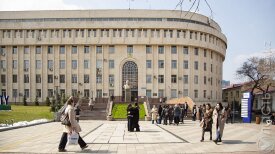Kazakhstan’s GDP growth this year did not affect people’s incomes. By the end of the year, high inflation had in fact pushed incomes into the red. A vicious circle sparked by the recent depreciation of the tenge currency is causing a price increase for imported goods. This, paired with the increase in utility tariffs and fuel prices, offset any overall economic gains.
Читайте этот материал на русском.
In 2025, the national economy will continue to grow, but the same cannot be said for purchasing power. Public finances, under pressure from a possible decline in oil prices, will limit the growth of salaries in the public sector.
At the same time, the private sector will face an increased tax burden due to an increase in social and pension contributions. The new Tax Code, which is due to be approved next year, also creates uncertainty.
Experts interviewed by Vlast forecast more frequent worker strikes as purchasing power declines. They argue that the government should reduce expenditures on artificial projects and employment across various sectors, reallocating these funds to social initiatives that promote genuine employment and drive production growth.
GDP Growth With Falling Incomes
According to a Halyk Finance report, the economy grew by 4.4% in the first 11 months of this year, mainly due to the non-oil sector (which grew by 5.1%).
Trade, which accounts for 15.8% of GDP, showed an exceptional growth rate of 8.2%, similarly to the non-food retail segment (9.7%).
In 2021, the beginning of the recovery after the COVID-19 pandemic, there was a comparable economic growth, but that was paired to an increase of citizens’ real incomes.
The extractive sector, which accounts for 13.5% of GDP and about 60% of budget revenues, went against the trend in 2024 and only grew by 0.1%. Oil production is only projected to reach 87.8 million tons (below the annual plan of 90.3 million tons) due to repairs at the Tengiz and Kashagan fields.
Despite good production results, investment in fixed assets was sluggish and mainly driven by government injections. In a context of declining investment, analysts calculated that since 2005, the share of investment to GDP has more than halved to 15%.
While the economy remains in the black – Halyk Finance expects a 4.2% growth in 2024 – this growth failed to translate into an increase in income. In the first 10 months of 2024, real incomes fell by 0.2%. By the end of the year, the decline is likely to be even more significant due to the recent weakening of the tenge, which will drive up the cost of both imported products and local products dependent on imported components.
Incomes fell most noticeably in construction, healthcare, public administration, and administrative services, where more than 50% of the country’s employees collectively work.
Salaries during the first three quarters of this year went up in several sectors: telecommunications (18.2%, averaging 673,000 tenge, or $1,225) and finance (14.7%, averaging 831,000 tenge, or $1,500), which employ 9% of the population. Incomes in agriculture also grew (10.6%), but the average salary remains low (284,000 tenge, or $518).
Who Cares About Salaries?
In 2023, the government set salary increases as one of the key social and economic objectives. The first decision was to increase the minimum wage from 70,000 to 85,000 ($155) in 2024.
“This meant that the incomes of about 1.8 million employees with salaries of up to 85,000 tenge increased. A higher minimum wage affected those who do not have special professional skills and qualifications,” the ministry of labor told Vlast.
Muslim Khassenov, associate professor at Maqsut Narikbayev University and a specialist in labor law and social policy, said that in 2024, the issue of income growth has disappeared from the government agenda.
The first law concerned women’s rights and the safety of children. It introduced harsher penalties for domestic violence, and paved the way for the development of infrastructure for victims, such as support centers.
The second law aimed to solve the problem of citizens’ debt. It granted citizens more protection from the abuse of consumer loans and the actions of collectors and fraudsters.
The third law addressed housing. The law turned Otbasy Bank into a development institution that deals with the distribution of housing.
Sholpan Aitenova, an economist and director of Zertteu Research, argued that the conversation about incomes fell down in the government’s priority list despite incomes being severely affected by macroeconomic factors.
“The government likes to equate GDP growth with improvement in welfare. But GDP growth is mainly based on oil production and sales. This sector does not employ many people, so the GDP poorly correlates with real welfare,” Aitenova told Vlast.
Aitenova noted that in the second half of 2024, discussions around the economy hinged on the budget crisis. Government officials countered these concerns by arguing that beefing up social spending was necessary.
“But if we delve into the numbers, this is not the case. We have large unproductive expenses in our budget, which artificially increase employment. If we reduce this funding, we will see a significant increase in unemployment. Those who are laid off will not be able to pay their bills, their mortgages, and we will face a banking crisis,” Aitenova argued.
This system has developed because the state budget has remained the primary source of financing for many years, Aitenova said. Having created unproductive pockets of enterprises and jobs in various sectors, the government has inflated its budget deficit.
“Due to inflation, the costs of maintaining unproductive employment have to be constantly indexed, which keeps state finances less in check. In terms of economic diversification, the government’s policies have not worked, and we remain dependent on the export of hydrocarbons and their prices,” the economist concluded.
Unpredictability and Tensions
In 2025, oil will continue to be a key factor for the economy and government finances. The tenge exchange rate, inflation, GDP growth, and real income growth will depend to a greater extent on crude production volumes and commodity prices.
However, the unpredictability of the actions of Donald Trump, who will take office as US president in early 2025, may lead to significant volatility in hydrocarbon prices.
In early December, Nurlan Baibazarov, then-minister of economy, said the government was ready in case oil prices shrank to $60/barrel. And should the price environment be hostile, the government would reduce budget expenditures.
When we asked Almasadam Satkaliyev about whether and how much oil production and revenue could deviate from the plans for 2025, the energy minister said:
“Analysts and agencies have different forecasts. But we need to consider that OPEC’s effective reduction quotas are effective as a stabilizing factor for prices.”
The Astana-based Center for Applied Economics Research (AERC) predicts the average annual oil price in 2025 will be $78-82/barrel. In addition to Trump’s policy, Libya’s return to the oil market could exert pressure on oil prices, along with the situation in the Middle East, and further inconsistency among the parties to the OPEC+ agreement to curb production. The latter includes Kazakhstan, which exceeded its allocated quotas throughout 2024.
According to AERC’s expectations, oil production in Kazakhstan will grow to 89 million tons. The launch of the Tengiz field expansion project in the second quarter of 2025 will help increase production further. This will also support the GDP, which may grow by 4-4.5% by the end of the year.
The budget deficit, according to AERC’s forecast, next year could grow to 4.7% of GDP (6.6 trillion tenge, or $12 billion), an increase of 0.6% compared to this year. Yet, the planned transfers from the National Fund will cover the deficit by only 5.2 trillion tenge ($9.5 billion).
Experts interviewed by Vlast believe that Kazakhstanis will feel the main effect of tariff increases and tenge depreciation in the first months of 2025. Given the possible volatility of oil prices and the tenge exchange rate, it is quite difficult to predict the dynamics of real incomes. AERC believes that they may increase by 5.4% in 2025.
The issue of real incomes, according to Khassenov, will determine the course of social policy in 2025. But raising wages will not be easy, especially in the private sector. He is not sure that private enterprises will agree to wage increases.
“Starting from the new year, the size of social contributions will increase from 3.5% to 5%. Employers will also have to make additional pension contributions for their employees. Moreover, social contributions will have to be made not only under employment contracts, but also under civil-law contracts. A new Tax Code will be adopted next year. This will affect both income and the cost of goods and services,” Khassenov noted.
Because of this, Khasenov expects the number of strikes to increase. If in 2024 it was mainly oil workers and miners who went on strike, in 2025 he believes labor actions could come from other professions as well.
More tensions could also rise in the oil sector as a host of oilfield services companies complete work on the Tengiz expansion project.
Aitenova said that under these circumstances, it is especially important for the government to cut spending on projects that do not contribute to economic development and create unproductive jobs. Otherwise, the external debt will continue to balloon, bringing the country’s public finances closer to collapse.
“It is necessary to preserve social spending in crucial spheres. Askhat Aimagambetov [of the parliamentary committee on social development] said that the government plans to reduce spending on cancer treatment. But this is not the kind of social spending that needs to be reduced. Overall, this would be an insignificant cut in comparison with the costs of administrative services,” Aitenova emphasized.
Instead, Aitenova proposed to abolish all instances of corporate social entrepreneurship. Their effectiveness and contribution to regional GDP, in her opinion, is questionable. Another expensive institution, the agency for strategic planning and reforms, could become just a department within a ministry, instead of being a behemoth under direct presidential supervision, that costs 22 billion tenge ($40 million) annually.
“The ministry of economy could perform the functions of the agency for strategic planning. But no-one is questioning this presidential initiative. We need to move away from this practice of automatically supporting the president's policies. We need to proceed from the expediency of various budget expenditures,” Aitenova concluded.
Поддержите журналистику, которой доверяют.










